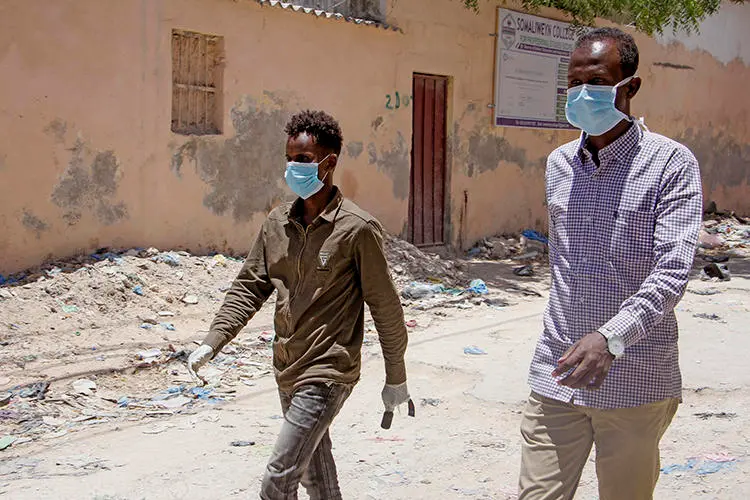Nairobi, April 16, 2020 — Somali authorities should immediately and unconditionally release journalist Abdiaziz Ahmed Gurbiye and guarantee that the media can cover and comment on the COVID-19 pandemic without facing jail time, the Committee to Protect Journalists said today.
On April 14, police arrested Abdiaziz, an editor and deputy director of the privately owned Goobjoog Media Group, after he responded to a summons to appear at the Hodan Police Station in Mogadishu, the capital, according to Goobjoog director Hassan Mohamud, who spoke to CPJ via messaging app, and a statement by the Somali Journalists Syndicate, a local press rights group.
Yesterday, Abdiaziz appeared in a Mogadishu court, where state prosecutors alleged that he had spread false news and offended the honor of the president, according to one of his lawyers, Mohamed Genboon, and Mohamed Ibrahim Moalimuu, secretary general of the Federation of Somali Journalists, another local press rights group, both of whom attended the hearing and spoke to CPJ via messaging app.
The accusations stemmed from Facebook posts Abdiaziz made on his personal page and on “Gurbiye Official,” a page that he manages, in which he alleged the government had mismanaged its COVID-19 response, and criticized President Mohamed Abdullahi Mohamed Farmaajo, according to Moalimuu and Hassan. On the two pages, which each have about 10,000 followers, the journalist posts a mix of original reporting and commentary, and also shares content originally published by Goobjoog.
Mohamed Genboon told CPJ that authorities did not produce a formal charge sheet against the journalist and said Abdiaziz was sent to Mogadishu Central Prison yesterday pending an investigation into the case.
“Every moment that Abdiaziz Ahmed Gurbiye remains detained sends the message that there is no room for critical reporting or commentary on the COVID-19 outbreak in Somalia,” said CPJ sub-Saharan Africa Representative Muthoki Mumo. “Somali authorities should immediately and unconditionally free Abdiaziz, and cease reacting to criticism by throwing journalists behind bars.”
Hassan said that he accompanied Abdiaziz to the police station in response to the summons on April 14, and that police showed them a court warrant for the journalist’s arrest and took him into custody.
The warrant, which CPJ reviewed, was issued in response to a complaint by the attorney general alleging that Abdiaziz contravened a section of Somalia’s penal code that makes it a crime, punishable with up to three years in jail, to “offend the honor or prestige” of the head of state or blame him for government actions.
Yesterday in court, the prosecution cited Abdiaziz’s Facebook posts and further accused him of contravening sections of the law stipulating up to six months in prison for the publication of false news, and up to a year prison for offending authorities by damaging official posters, according to Mohamed Genboon and Moalimuu. The prosecution also accused him of violating a section of the penal code on international reciprocity for crimes committed against foreign heads of state, but did not clarify how Abdiaziz was alleged to have contravened that section, Mohamed Genboon and Moalimuu said.
Mohamed Genboon told CPJ that the court rejected Abdiaziz’s bail application and said the journalist’s lawyers were filing applications challenging the jurisdiction of the court hearing the case and the judge who issued the arrest warrant.
CPJ reviewed two of Abdiaziz’s Facebook posts, both published on Gurbiye Official and his personal account on April 13. One of the posts alleges that the president had taken away a ventilator donated to a local hospital. The second alleges a lack of drugs at the same local hospital and corruption on the part of public officials.
In a phone call, Ismael Mukhtar Omar, the spokesperson of Somalia’s Ministry of Information, referred CPJ to the police for comment on the case. Deputy Police Commissioner Zakia Hussein Ahmed did not answer phone calls from CPJ or respond to text messages.
In texts sent via messaging application yesterday, presidential spokesperson Abdinur Mohamed told CPJ that the presidency had not instituted any complaint against Abdiaziz and, citing the independence of other state organs, declined to comment substantively on the case.
CPJ called, emailed, and texted Attorney General Suleiman Mohamed Mohamud and Muse Moalim Mohamed, chairman of the Banadir Regional Court, but did not receive any responses.
